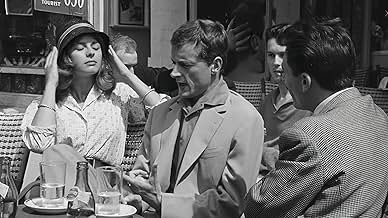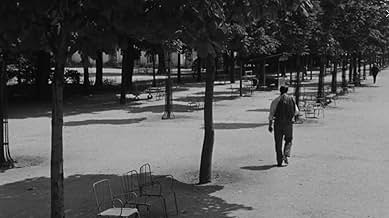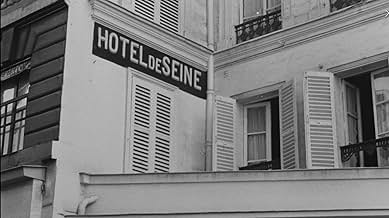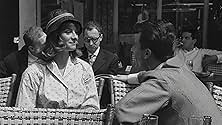Le signe du lion
- 1962
- 1h 43min
CALIFICACIÓN DE IMDb
7.2/10
2.4 k
TU CALIFICACIÓN
Agrega una trama en tu idiomaA French-American in Paris lives by sponging off his working friends, and throws a party using borrowed money when his rich American aunt dies, believing firmly in his horoscope.A French-American in Paris lives by sponging off his working friends, and throws a party using borrowed money when his rich American aunt dies, believing firmly in his horoscope.A French-American in Paris lives by sponging off his working friends, and throws a party using borrowed money when his rich American aunt dies, believing firmly in his horoscope.
- Dirección
- Guionistas
- Elenco
- Premios
- 1 nominación en total
Marie Dubois
- La jeune femme au café
- (sin créditos)
- Dirección
- Guionistas
- Todo el elenco y el equipo
- Producción, taquilla y más en IMDbPro
Opinión destacada
This film was made right at the birth of the New Wave, in the same year as Chabrol's second film, the seminal New Wave missile Les Cousins (incidentally Le Signe de Lion was produced by Chabrol), and Truffaut's first big knockout blow, the 400 blows. Godard was only to get his act together in the following year, 1960, with Breathless.
To me this is a masterpiece cut from the same cloth. There are glimpses of mysticism in Rohmer's film The Green Ray, but really this film takes that a lot further, it's a movie that really plays around with chance and fortune. Pierre Wesselrin, of Germano-American origin, is a small-time Parisian composer who has never made a cent out of his music. He talks a lot about having been lucky all his life, and he is, he's fallen in with a crowd of rich friends and he's always bathed in rive gauche society, even though he's not a great talent and is very lazy, he seems to be able to get people to give him money. There's a very Rivettian feel to the start of the movie, Wesselrin throws a party and you have, for example, this guy who is indoors at nighttime wearing dark glasses, he's listening to this febrile, screeching section of some classical music over and over again, repeatedly bringing back the needle of the record player. There's these little throwaway poetical typically French sophistries where they talk allegorically about Venus, and a woman says that no-one lives there because it's too close to the sun, it's good but I'm sure it sounds better in a marijuana haze.
So I don't want to give too much of the plot away, but there ends up being a lot of solitary wandering about Paris. I thought the ultimate poetic vision of Paris was Rivette's Paris Belongs To Us, but this is up there on that level. Rohmer somehow makes Paris feel like a giant coffin, or a kind of Byzantine, encrusted, cemetery.
There's the traditional view of this film which concerns the perils of believing in one's good fortunes, but I think on the whole it's far more mystical, really pointing at Wesslrin's life being ruled by the stars. It's just gorgeous as well. They must have built the walkways along the Seine when people believed in Arcadia, which they don't anymore. The photography just blows me away, favourites being Wesselrin in a floppy hat singing by the Seine, and his violin sonata played at the start of the film as the camera glides over the Seine.
There's a critical idea with this movie about the perils of entrusting your fate to luck. I don't follow that one bit. My reading is that Wesselrin is lucky throughout the movie, in fact his experiences are what enable him to finally finish his violin sonata, and also to appreciate his lucky situation in life. He reminds me of Tartini, a composer who is famous for only one work, The Devil's Trill, a violin sonata which he heard in his dreams (supposedly he saw the Devil playing), and then transcribed upon awaking.
I really felt like screaming after I had finished watching this at quarter to one in the morning, I think I got a few strangled gurgles out, would not have been good to wake the house up. This is why I watch cinema, for the feeling of ecstasy (ec - stasy, literally out of stasis).
A friend pointed out to me that many of Rohmer's later trademarks are present in this film, "the seemingly artless but carefully constructed mise-en-scène". I like to refer to his mise-en-scène as situational, he often does scenes that remind me of the bit in Meshes of the afternoon when a mystical hand lowers a sunflower. It's almost like their are supernatural beings placing objects to be found by the participants in the film.
To me this is a masterpiece cut from the same cloth. There are glimpses of mysticism in Rohmer's film The Green Ray, but really this film takes that a lot further, it's a movie that really plays around with chance and fortune. Pierre Wesselrin, of Germano-American origin, is a small-time Parisian composer who has never made a cent out of his music. He talks a lot about having been lucky all his life, and he is, he's fallen in with a crowd of rich friends and he's always bathed in rive gauche society, even though he's not a great talent and is very lazy, he seems to be able to get people to give him money. There's a very Rivettian feel to the start of the movie, Wesselrin throws a party and you have, for example, this guy who is indoors at nighttime wearing dark glasses, he's listening to this febrile, screeching section of some classical music over and over again, repeatedly bringing back the needle of the record player. There's these little throwaway poetical typically French sophistries where they talk allegorically about Venus, and a woman says that no-one lives there because it's too close to the sun, it's good but I'm sure it sounds better in a marijuana haze.
So I don't want to give too much of the plot away, but there ends up being a lot of solitary wandering about Paris. I thought the ultimate poetic vision of Paris was Rivette's Paris Belongs To Us, but this is up there on that level. Rohmer somehow makes Paris feel like a giant coffin, or a kind of Byzantine, encrusted, cemetery.
There's the traditional view of this film which concerns the perils of believing in one's good fortunes, but I think on the whole it's far more mystical, really pointing at Wesslrin's life being ruled by the stars. It's just gorgeous as well. They must have built the walkways along the Seine when people believed in Arcadia, which they don't anymore. The photography just blows me away, favourites being Wesselrin in a floppy hat singing by the Seine, and his violin sonata played at the start of the film as the camera glides over the Seine.
There's a critical idea with this movie about the perils of entrusting your fate to luck. I don't follow that one bit. My reading is that Wesselrin is lucky throughout the movie, in fact his experiences are what enable him to finally finish his violin sonata, and also to appreciate his lucky situation in life. He reminds me of Tartini, a composer who is famous for only one work, The Devil's Trill, a violin sonata which he heard in his dreams (supposedly he saw the Devil playing), and then transcribed upon awaking.
I really felt like screaming after I had finished watching this at quarter to one in the morning, I think I got a few strangled gurgles out, would not have been good to wake the house up. This is why I watch cinema, for the feeling of ecstasy (ec - stasy, literally out of stasis).
A friend pointed out to me that many of Rohmer's later trademarks are present in this film, "the seemingly artless but carefully constructed mise-en-scène". I like to refer to his mise-en-scène as situational, he often does scenes that remind me of the bit in Meshes of the afternoon when a mystical hand lowers a sunflower. It's almost like their are supernatural beings placing objects to be found by the participants in the film.
Argumento
¿Sabías que…?
- TriviaEric Rohmer's first feature film.
- Citas
Pierre Wesselrin: I am everything: American, Austrian, Swiss...
- ConexionesReferenced in Der Stadtstreicher (1966)
Selecciones populares
Inicia sesión para calificar y agrega a la lista de videos para obtener recomendaciones personalizadas
- How long is Sign of the Lion?Con tecnología de Alexa
Detalles
- Fecha de lanzamiento
- País de origen
- Idiomas
- También se conoce como
- Sign of the Lion
- Locaciones de filmación
- Productora
- Ver más créditos de la compañía en IMDbPro
Taquilla
- Total a nivel mundial
- USD 792
- Tiempo de ejecución1 hora 43 minutos
- Color
- Mezcla de sonido
- Relación de aspecto
- 1.66 : 1
Contribuir a esta página
Sugiere una edición o agrega el contenido que falta

Principales brechas de datos
By what name was Le signe du lion (1962) officially released in Canada in English?
Responda



























